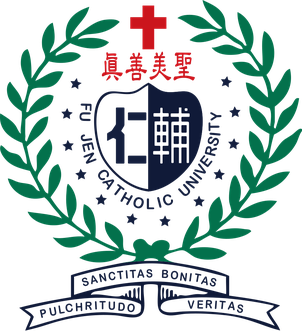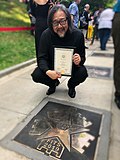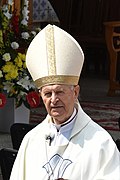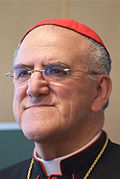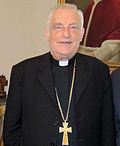Fu Jen Catholic University
Catholic University in New Taipei City, Taiwan From Wikipedia, the free encyclopedia
Fu Jen Catholic University (FJU, FJCU or Fu Jen; Chinese: 天主教輔仁大學 or 輔仁大學) is a private Catholic university in Xinzhuang, New Taipei City, Taiwan. The university was founded in 1925 in Beijing at the request of Pope Pius XI and re-established in Taiwan in 1961 at the request of Pope John XXIII.[3]
 | |||||||||||
Former name | Catholic University of Peking (1925–1950) | ||||||||||
|---|---|---|---|---|---|---|---|---|---|---|---|
| Motto | 真、善、美、聖 (Mandarin) Sanctitas, Bonitas, Pulchritudo, Veritas (Latin) | ||||||||||
Motto in English | Sanctity, Beauty, Goodness, Truth | ||||||||||
| Type | Private, Catholic, Coeducational Higher education institution | ||||||||||
| Established | 1925 | ||||||||||
| Founder | Barry O'Toole and Aurelius Stehle | ||||||||||
Religious affiliation | Roman Catholic (Jesuit and SVD) | ||||||||||
Academic affiliations | [1] | ||||||||||
| Chairman | Peter Liu Cheng-chung | ||||||||||
| President | Francis Yi-Chen Lan | ||||||||||
Academic staff | 1,942[2] | ||||||||||
| Undergraduates | 22,395 | ||||||||||
| Postgraduates | 4,041 | ||||||||||
| Location | , | ||||||||||
| Colors | Vatican Yellow Virgin Blue Angel White | ||||||||||
| Website | www | ||||||||||
| Chinese name | |||||||||||
| Traditional Chinese | 天主教輔仁大學 | ||||||||||
| Simplified Chinese | 天主教辅仁大学 | ||||||||||
| |||||||||||
Fu Jen has consists of twelve colleges and schools, among which are several of Taiwan's first or only academic units in Italian language, info-management, museology, religious studies, philosophy.[4] The campus is served by Fu Jen University Station, Taiwan's first metro station named after a university.
Fu Jen is the oldest Catholic and Jesuit-affiliated institution of higher education in the Sinophone world, under the direct authority of the Congregation for Catholic Education of the Holy See.[5][6][7] It is also a non-state actor of Track II diplomacy in the Holy See–Taiwan relations.[8][9][10] Therefore, Fu Jen has special importance internationally and is known for its strong ties with the Roman Curia.[11] In the past nearly one hundred years of history, the Benedictine, the Verbites, and the Jesuits from all over the world have participated in the management of the university.
The university has the nation's first business school there with AACSB accreditation[12] and also the medical college was the earliest to promote PBL as pedagogy for medical education. Fu Jen alumni include Premier Lin Chuan, former First Lady of China Wang Guangmei, and politicians in the Legislative Yuan.[13]
History
Summarize
Perspective
Early history
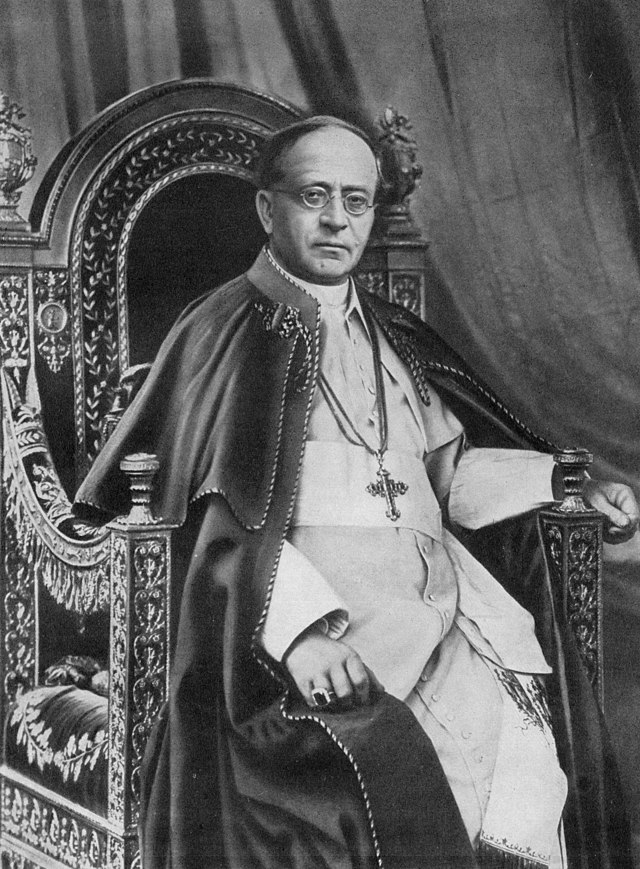

The institution was originally established in Beijing in 1925 by the Benedictines of St. Vincent Archabbey in Latrobe, Pennsylvania, at the request of the Holy See, with Archabbot Aurelius Stehle serving as chancellor.[14] Fu Jen, then commonly known as the Catholic University of Peking, was itself a successor to the Fu Jen Academy (Chinese: 輔仁社), which was created through the efforts of Catholic scholars Ma Xiangbo and Ying Lianzhi. The university's first president (1925–1927) was the American missionary George Barry O'Toole, OSB. He was succeeded by Chen Yuan, a Chinese Protestant and renowned historian, who remained university president until the school's forced closure by the Chinese Communist government in 1952.
In 1933 the Benedictines in the United States, in the midst of the Great Depression, were no longer able to sustain Fu Jen's mission. Administration of the university passed to the Society of the Divine Word in Germany. Its affiliation with Germany, an ally of Imperial Japan, helped protect university personnel from extreme brutality inflicted elsewhere by occupying Imperial Japanese soldiers during the Sino-Japanese War (1937–1945).
After World War II

Since the university's operation had not been interrupted by the war, it quickly became one of China's top science programs. Well-known scientists such as Chien Shih-Liang taught at Fu Jen, and graduates such as Lee C. Teng and Wang Guangmei became famous alumni. On December 24, 1945, Thomas Tien Ken-sin, the university chairman, was made a cardinal. The following year, the School of Agriculture was added and preparations for the School of Medicine began. Also in the same year, the first Taiwan Alumni Association of Fu Jen was established in Dadu, Taichung, Taiwan.[15]
After the Communists assumed power in China in 1949, religious organisations, including the Catholic Church, began to be systematically repressed. In 1952 this intensified and the government merged Fu Jen with the Beijing Normal University, Peking University, Renmin University, China University of Political Science and Law, and Central University of Finance and Economics. Under Mao Zedong's arrangement, Chen Yuan, the former president of Fu Jen, was transferred to the Normal University as the new president.
Cold War era
Although the Taiwan Provincial Government promised to donate land near Yuanshan Area in Taipei in 1948 to serve as the school site for Fu Jen to move to Taiwan, the Roman headquarters of the Society of the Divine Word soon ordered the suspension of all activities.[16] The following year, the university's American representative Rev. Ralph Thyken, S.V.D. came to Tokyo, Japan, to prepare for the establishment of a new Nagoya Catholic University, which is now Nanzan University.[17] Until the Holy See formally ordered the university's re-establishment in Taiwan, the history of Fu Jen was interrupted for about ten years.
Fu Jen Catholic University was re-established in 1961 in Taiwan, and Paul Yu Pin, the former Ordinary of Roman Catholic Archdiocese of Nanjing, was appointed as the new president by Pope John XXIII. The new school opened under the auspices of the Chinese Regional Bishops' Conference, the Society of Jesus, and the Society of the Divine Word.[citation needed]
The new Fu Jen's academics sprouted from Western history, medieval philosophy, Christian thought, and European languages. It is the only comprehensive university in Taiwan that fully integrates Western thought, history, language, religion, and art. Since the 1960s, the university's philosophical tradition has been Scholasticism and Paul Yu Pin's "Three Kinds of Knowing" (三知論), focusing on the development of a Catholic philosophy that incorporates Confucianism and opposing the "relativism hegemony".[18][19]
During the thirty years of the Cold War, many Western priests and nuns were sent to teach at the university and imported advanced scholarship into Taiwan. Many professors have been commended for this in recent years, such as Daniel Ross from the United States, Leopoldo Vicente from Spain, Marcina Stawasz from Poland, etc.[20][21][22]
Modern era
In 1997, the Nobel Prize winner 14th Dalai Lama came to Fu Jen to hold a Dharma promotion conference (lecture) and held talks with Taiwan Governor James Soong (Taiwan's second most powerful person) in the university president’s office.[23]

Fu Jen has expanded rapidly since the 1990s. The number of students and social influence has long maintained the top five in the country, and the number of colleges has been closely following the National Taiwan University. So far in the 21st century, the university has since grown to comprise twelve colleges and schools and a hospital. In 2001, Fu Jen has been the first college in Taiwan that actively reduces tuition and fees.[24]
Fu Jen Catholic University Hospital was opened in September 2017. The College of Medicine can be used as a conduit for cooperation between different academic disciplines, and assume a leading role in bringing together the colleges of biotechnology, chemistry, physics, engineering, management, and foreign languages. The establishment of a completely new curriculum and unique program will include training in hospital management and medical translation, research in laser technology and biotechnology, integration of Western and Chinese medicine, and robotic surgery.[25]
Ideal and governance
Summarize
Perspective
The university motto, 真、善、美、聖 (Veritas, Bonitas, Pulchritudo, Sanctitas in Latin), expresses four ideals: truth, goodness, beauty and sanctity.
The laurel wreath symbolizes honor and peace while the twelve stars signify the Virgin Mary. The cross represents the Christian faith. The two colors on the shield suggest Christ's dual nature as the rounded shape of the shield recalls the Sacred Heart. The Latin words on the banner beneath the emblem, the university motto, express the four ideals of the university while the three folds of the banner suggest the Trinity.
Based on the Christian faith, the university president clearly supports the abolition of the death penalty, opposes abortion, and opposes the utilitarianization of higher education.[26][27]
|
Chairman of the Board of Trustees
|
Presidents
|
Impact
Summarize
Perspective

The flags of Vatican City, Republic of China (Taiwan), and the University flag displayed in the university.
Relying on the authority of the Vatican and the Society of the Divine Word, Fu Jen, then known as the Catholic University of Peking, was the only university in Beijing that was not taken over and controlled by Empire of Japan during the Second Sino-Japanese War. In the white terror period of the cold war, Fu Jen was able to prevent the Kuomintang regime from interfering in school affairs and protect the students' freedom of speech under the serious concern of the Secretariat of State (Holy See).[28]
Fu Jen Catholic University belongs to the International Federation of Catholic Universities (IFCU) under the United Nations Educational, Scientific and Cultural Organization (UNESCO). After the United Nations General Assembly Resolution 2758 came into effect in 1971, Fu Jen is the only university in Taiwan that has continuously participated in UNESCO for a long time. In the official Holy See–Taiwan relations, the university has repeatedly promoted substantial exchanges between the two countries.[29] All the traditional Taiwanese ambassadors to the Holy See will be awarded an honorary doctorate degree from Fu Jen after leaving office. All the papal nuncio in Taiwan will also participate in the annual university opening ceremony.[30]
The appointment and removal of the post of Fu Jen university president is a matter of inquiry by the Secretary of State of the Holy See, and has been compared with the membership of the United Nations of the Republic of China (Taiwan).[31] The issue of the internal reorganization of Fu Jen has also widely affected the intervention of the Ministry of Education of the two countries and the papal nuncio to Taiwan.[32]
The chairman or the president of the university has always accompanied the president of Taiwan to visit the Holy See. In 2005, under the intervention of Fu Jen, the seat of the Taiwanese president was placed in the first row of heads of state, ahead of the US Vice President Dick Cheney and German Chancellor Angela Merkel.[33] In 2013, the university further designated the products of the Fu Jen alumni's enterprise Franz-porcelains as the official national gift, which were presented to Pope Francis and the retired Pope Benedict XVI respectively.[34]
Academics
Summarize
Perspective
| College/school | Founded |
|---|---|
| College of Liberal Arts | 1927 |
| College of Education | 1929 |
| College of Science and Engineering | 1929 |
| College of Human Ecology | 1939 |
| College of Foreign Languages | 1963 |
| School of Law | 1963 |
| College of Management | 1969 |
| College of Fine Arts | 1983 |
| College of Medicine | 1990 |
| College of Social Science | 2003 |
| College of Communication | 2010 |
| College of Fashion & Textiles | 2017 |
The university at present comprises 12 colleges with more than 25,000 students.[35]
- College of Liberal Arts
- Department of Chinese Literature
- Department of History
- Department of Philosophy
- College of Fine Arts
- Department of Music
- Department of Applied Arts
- Department of Landscape Architecture (CH)
- Bachelor's degree program of Art and Cultural Creation (CH)
- College of Communication
- Department of Communication Arts
- Department of Journalism & Communication Studies
- Department of Advertising & Public Relations
- Graduate Institute of Mass Communication
- College of Education
- Department of Physical Education
- Department of Library and Information Science
- Graduate of Educational Leadership and Development
- Program of Sport Recreation Management
- College of Fashion and Textiles
- Department of Textiles and Clothing
- Graduate Institute of Museum Studies
- MA Program in Brand and Fashion Management
- College of Medicine
- School of Medicine
- Department of Nursing
- Department of Public Health
- Department of Clinical Psychology
- Department of Occupational Therapy
- Department of Respiratory Therapy
- Graduate Institute of Biomedical and Pharmaceutical Science
- MS Program in Transdisciplinary Long Term Care
- MS Program in Biomedical Big Data Analysis
- Ph.D. Program in Pharmaceutical Biotechnology
- College of Science and Engineering
- Department of Mathematics
- Department of Physics
- Department of Chemistry
- Department of Life Science
- Department of Computer Science & Information Engineering
- Department of Electrical Engineering (Electronic Engineering)
- Bachelor's Program in Medical Informatics and Innovative Applications
- Graduate Institute of Applied Science and Engineering
- Bachelor Program in Software Engineering and Digital Innovation Application
- Bachelor Program in Artificial Intelligence and Information Security
- College of Foreign Languages and Literatures
- Department of English Language and Literature
- Department of German Language and Culture
- Department of French Language and Culture
- Department of Spanish Language and Culture
- Department of Japanese Language and Culture
- Department of Italian Language and Culture
- Graduate Institute of Cross-Cultural Studies
- College of Human Ecology
- Department of Child and Family Studies
- Department of Restaurant, Hotel and Institutional Management
- Department of Food Sciences
- Department of Nutrition Science
- Ph. D. Program in Nutrition and Food Science
- School of Law
- Department of Law
- Department of Financial and Economic Law
- Graduate Department of Law
- College of Social Science
- Department of Sociology
- Department of Social Work
- Department of Economics
- Department of Religious Studies
- Department of Psychology
- Bachelor's Program in Catholic Studies
- Master Program in Non-Profit Organization Management
- College of Management
- Department of Business Administration
- Department of Accounting
- Department of Statistics and Information Science
- Department of Finance and International Business
- Department of Information Management
- Graduate Institute of Business Administration
- MS Program of Technology Management
- Master Program of Global Entrepreneurial Management
- Master of Global Entrepreneurial Management (MGEM – FJU, IQS, and USF)
- MBA Program in International Management (imMBA)
- Master's Program in Social Enterprise
- Bachelor's Program of Business Management
Teaching


Fu Jen University established Taiwan's first graduate-level program in conference interpreting, the Graduate Institute of Translation and Interpreting Studies (GITIS). Also Fu Jen has annexed a Mandarin Language Center, established in 1964[36] to address the need for foreign missionaries to learn Chinese teaching hundreds of students each semester from countries worldwide[37] Taiwanese,[38] and every semester offers cultural classes such as Chinese Poetry, Chinese calligraphy, and Taijiquan.[39][40]
The School of Medicine is one of the medical schools in Taiwan to adopt the pedagogy, "problem-based learning (PBL)", first developed at McMaster University Medical School in Canada, so that students can acquire medical knowledge from small group discussions and case studies. The implementation of PBL has won applause from the Taiwan Medical Accreditation Council and brought a wave of reform in medical education in Taiwan. In order to successfully practice PBL, the School has recruited basic scientists with specialties in various areas as well as more than one hundred clinicians as a strong backbone for teaching. Fu Jen's is the only medical school in Taiwan which uses PBL as a pedagogy for the third and fourth year curriculum.
Research
Fu Jen Catholic University has a long history of publishing journals. The main journals are as follows:
- Monumenta Serica
- Universitas: Monthly Review of Philosophy and CultureA&HCI
- Fu Jen Studies
- Fu Jen Law Review
- Fu Jen Journal of Chinese Literature
- Journal of the Pre-Qin and Han Dynasties
- Journal of The Graduate Institute Chinese Literature Department of Fu Jen Catholic University
- Fu-Jen Journal of Medicine
- Fu Jen Management Review
- Fu Jen Journal of Foreign Languages
- Fu Jen Historical Journal
- Fu Jen Religious Studies
- Journal of Physical Education Fu Jen Catholic University
- Social Analysis
Fu Jen Academia Catholica was inaugurated on August 1, 2008, to enable interdisciplinary pursuits in Catholic studies. The Academia consists of five Fu Jen academic institutes or centers: the Institute of Scholastic Philosophy, Institutum Historiae Ecclesiae, Center for the Study of Science and Religion, Monumenta Serica Sinological Research Center, and John Paul II Institute for Research into Dialogue for Peace.
Globalization
- Fu Jen - Stanford
- In September 2015, Fu Jen Catholic University has signed an agreement (MOU) to cooperate with Stanford Prevention Research Center, SPRC, promoted by Stanford University. The aim is to globally research the Wellness of humans.[41]
- Fu Jen - Oxford
- In September 2012, Fu Jen Catholic University cooperated with the University of Oxford in the United Kingdom and the Pontifical University of Saint Thomas Aquinas in Italy and opened a new degree in philosophy and finance. The purpose is to emphasize the importance of the integrity for future Politicians and Financiers. The program combines the professional knowledge in finance and the idea in philosophy.[42]
- Fu Jen - IQS -USF
- Master in Global Entrepreneurial Management (MGEM) is a joint-program offered by Fu Jen Catholic University, Ramon Llull University (IQS in Spain), and the University of San Francisco (USF in the US). It is ranked 43rd worldwide on the FT Masters in Management Rankings 2017.
- Fu Jen - UC Berkeley
- Professors from University of California, Berkeley, are constantly invited and hold lectures in Fu Jen Catholic University[43]
- Global Leadership Program with universities in Japan, Korea and Philippines
- Since 2008, the Global Leadership Program was started for students from four Jesuit universities in East Asia: Sophia University in Japan, Sogang University in South Korea, Ateneo de Manila University in the Philippines and Fu Jen Catholic University in Taiwan.[44]
- Service-Learning Center
- In 2015, Fu Jen Catholic University Service-Learning Center organised the 5th Asia-Pacific Regional Conference on Service-Learning.[45][46]
Rankings & Reputation
Summarize
Perspective
| Fu Jen Catholic University rankings | |
|---|---|
| Global – Overall | |
| ARWU World[47] | n/a (2022) |
| QS World[48] | 1201–1400 (2024) |
| THE World[49] | 1001–1200 (2023) |
| USNWR Global[50] | 1526 (2023) |
| Regional – Overall | |
| QS Asia[51] | 261–270 (2023) |
| THE Asia[49] | 301–350 (2023) |
| National – Overall | |
| QS National[52] | 20 (tie) (2024) |
| THE National[49] | 16 (tie) (2023) |


Fu Jen ranks at the top of Taiwan's private universities for top-ranked fields of study and distinguished alumni.[53][54] The university has always been ranked in the QS World University Rankings and Times Higher Education World University Rankings, which is among the top 10% in the whole country.[55][56] In addition, Fu Jen is the representative university of New Taipei City by QS Most Affordable Cities for Students Ranking.[57] The Mayor of New Taipei City once pointed out in 2021 that "Fu Jen is the core of talent, academics and medical care in New Taipei City".[58][59]
Fu Jen College of Management is one of the best business schools in Taiwan, with highly internationalization and powerful Amazon Web Services cloud computing teaching resources.
In 2014, the representative of Japan in Taiwan listed Fu Jen Catholic University as one of the seven well-known Taiwanese universities.[60]
- Taiwan's Most Popular University Ranking
- According to a survey conducted by the electronic media DailyView in 2018, Fu Jen ranks 4th among 141 universities in Taiwan, and is also ranked 1st among private universities. In fact, the university is also the third-largest university in the country with the largest number of students.[61]
- World's Top Catholic Universities Ranking
- According to 2021 uniRank Top Catholic Universities in the world, Fu Jen ranks 1st in Taiwan, 3rd in Asia, 54th worldwide among 610 universities.[62]
- Times Higher Education Impact Ranking
- In 2020, Fu Jen is ranked as 201st-300th by Times Higher Education Impact Ranking (5th nationally).[63]
- Times Higher Education Ranking
- In 2020, Fu Jen is ranked top 1000 worldwide (10th nationally) by Times Higher Education World University Rankings, and the citation rate of the paper is ranked 7th nationally.[63]
- In 2021, Fu Jen is ranked 168th in by Times Higher Education Asia University Rankings.[64]
- Global Entrepreneurial Management by Financial Times UK
- In 2020, the cooperated Program "Master of Global Entrepreneurial Management" between Fu Jen, Instituto Químico de Sarriá Barcelona, IQS School of Management in Spain and University of San Francisco in the United States was ranked 19th globally by Financial Times, United Kingdom.[65]
- APQN Internal Quality Insurance Reward
- In 2012, Fu Jen became a member of Asia-Pacific Quality Network, APQN. In 2013, Fu Jen has again passed the evaluation of the APQN International Conference Assessment. It was the only University, which was awarded in Taiwan.[66]
- AACSB Global Business Accreditation
- In April 2005, Fu Jen obtained the most authorized certification of business school and MBA degree from AACSB. Only five universities in Taiwan obtained the certification.[12][67]
- IFT International Certification
- The Department of Food Science at Fu Jen Catholic University was reviewed by the Higher Education Review Board (HERB) of the Institute of Food Technologists (IFT), and successfully obtained the IFT International Certification. It also became the first in Taiwan to obtain IFT Certified academic unit.[68]
Campus
Summarize
Perspective
Fahy Memorial Library
Kungpo Memorial Library
Cardinal Shan Library
The campus of Fu Jen Catholic University (including the University Hospital) is 348,360 square meters, the size is close to the Vatican City State, Japan's Kyushu Imperial University Hakozaki Campus, and the world-renowned Osaka University Toyonaka Campus.[69][70][71][72]
Fu Jen's Xinzhuang campus is known as "tree house campus".[73]
- Before 1951: Dingfu Street, Xicheng District, Beijing (today Beijing Normal University north campus and CPCA building). It is located in Shichahai area in central Beijing and surrounded by ancient Hutong. The Prince Kung's Mansion used to be part of Fu Jen's campus.
- After the 1960s:
- Main campus: Xinzhuang District, New Taipei (1963–present)
- 2nd campus: Daan District, Taipei (1961-2011, today Chinese Regional Bishops' Conference building)
Libraries
- Kungpo Memorial Library (Library for College of Literature)
- Schutte Memorial Library (Library for College of Engineering; abolished)
- Fahy Memorial Library (General Library)
- Paul Cardinal Shan Library (Library for College of Medicine)
- Theology Library
Transportation
A special plank road from Exit 1 of the metro station to the main entrance of the university.
Student life
Summarize
Perspective
The Ceremony of Venerating the Heavens and Ancestors (祭天敬祖大典) was held for the first time since Cardinal Paul Yu Pin in 1979, advocating gratitude to nature and thinking of ancestors. Freshmen from the Department of Chinese Literature will sing a section of Classic of Poetry in the ceremony.
Student groups
Fu Jen Catholic University currently has more than 100 student clubs, divided into 6 categories: academic, artistic, service, leisure and social, physical clubs, and musical clubs.[74]
The Cyan Rhyme Award (輔大青韻獎) was founded in 1977, it is an annual singing and song composition competition. Many well-known singers and artists have participated in the competition when they were studying at Fu Jen, such as Jolin Tsai, F.I.R. and so on.[75]
Religious tradition
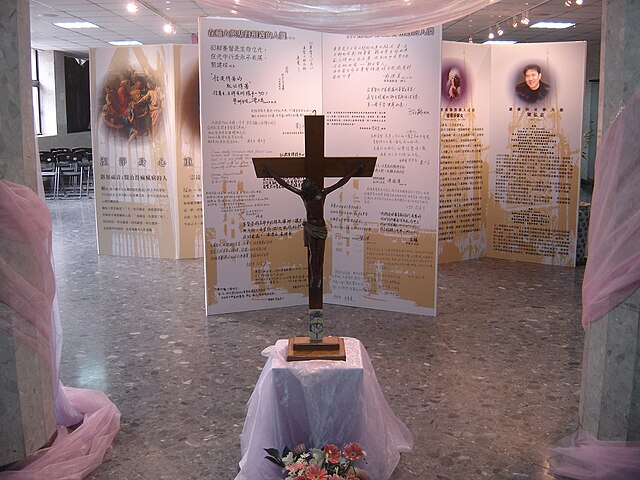
Every year during the Catholic Lent, a two-week Religious Life Week is held to celebrate Catholic Holy Week and Easter.[76] In October, the university priests hold the Pray for the Country Mass in the university chapel, praying for God's protection and blessing to the country, government officials, all the people and world peace.[77]
During the martial law period, only Fu Jen and Tunghai University held College Christmas Balls in Taiwan, which is known as "the Fu Jen in the North, the Tunghai in the South (北輔大,南東海)." This makes them the representative college Christmas ball in Taiwan.
Democratic tradition
Fu Jen professors and students are first initiators and participants for many famous student movements in the history of Taiwan and China, such as the May Fourth Movement, the December 9th Movement the Consciousness Movement, the Wild Lily student movement, the Reconciliation Movement of the Case of Su Chien-ho, the Losheng Sanatorium Retention Movement, and the Wild Strawberry Movement. At the end of Taiwan's martial law, the Fu Jen student once published the underground publication Reform (改造), which was the first demonstration of democratic activities on campus in Taiwan, but it was quickly banned.[citation needed]
In May of each year, Fu Jen regularly holds elections of student self-government organizations at all levels of the school (the president of the student union, members of the student council, representatives of all levels of university meetings, etc.) to implement student autonomy and democratic political education. Electronic voting was used for the first time in 2013 to enhance the convenience of student participation.[78]
Athletics
Summarize
Perspective
Fu Jen Catholic University has at least 31 school-level sports teams. The Fu Jen baseball team is the most famous university baseball team in Taiwan, it has created the reputation of "Taiwan's Sokei-sen".[79] The Fu Jen Dragon Boat Team is the first international university dragon boat team in Taiwan and an important role in national sports diplomacy.[80][81]
Fu Jen is also the only university in Taiwan that has a men's football team and a women's football team.[82][83] It not only participates in the University Football Association, but also has the qualifications for the Taiwan Football Premier League and the Taiwan Mulan Football League. Several students have represented Taiwan to play in the AFC Cup.[84][85]
Fu Jen has always been the cradle of East Asian professional baseball and professional basketball stars. Among other sports, Lee Fu-an (twice champion at the Asian Athletics Championships), Cheng Chao-tsun (2017 Summer Universiade Javelin gold medal, breaking Asian record), Kuo Hsing-chun (2020 Summer Olympics & 2017 Summer Universiade weightlifting gold medal), Lin Yun-Ju (2020 Summer Olympics bronze medal, Taiwan's youngest player in the World Table Tennis Championships) are all alumni or students of the university. In recent years, Fu Jen has consecutively ranked first among private schools in the National Intercollegiate Athletic Games in 2016, 2017 and 2018.
2020 Summer Olympics
Fu Jen sent 8 athletes to participate in the 2020 Tokyo Olympics, and a total of 4 people won 3 medals for the Taiwanese team. Including the sixth gold medal in Taiwan's Olympic history.
| Medal | Athletes | Sports | Subjects | Dates |
|---|---|---|---|---|
| Kuo Hsing-chun | Weightlifting | Women's 59 kg | July 27 | |
| Lin Yun-Ju, Cheng I-ching | Table tennis | Mixed doubles | July 26 | |
| Huang Hsiao-wen | Boxing | Women's flyweight | August 4 |
Notable alumni
Summarize
Perspective
Fu Jen alumni (輔大人) number near 200,000, they work in various fields. Alumni working in political fields include at least 25 congressman in Legislative Yuan, 3 Taiwanese Justices of Constitutional Court, 3 Taiwanese Premier/Vice-Premier, 2 Taiwanese Minister/Deputy-Minister of National Defense, a large number of Taiwanese diplomats, mayors and magistratea, and former Chinese first lady Wang Guangmei.
Notable alumni of academia are Wei-min Hao, climate scientist and contributor to the IPCC (shared the 2007 Nobel Peace Prize), Harvard professor Lee-Jen Wei, notable physicist Lee C. Teng. In addition, there are also alumni working at Yale, Stanford, Columbia, Cornell, Georgetown, Northwestern, UCLA, USU, Howard University, Nanzan University, and National Taiwan University, etc. So far, many academicians and university presidents/vice-presidents such as Tsinghua's Liu Da, Texas A&M's Yang, Fu Jen's Bernard Li, NTPU's Hou Chong-wen, NDHU's Chin-Peng Chu, NUK's Yueh-Tuan Chen, NKUHT's Chi-Yeh Yung, FCU's Pao-Long Chang, Shih Hsin's Ting-ming Lai, Chia Nan's Suen-Zone Lee, and 3 presidents of Providence University all have graduated from Fu Jen Catholic University. Among the humanities scholars, such as the former director of National Palace Museum, Chou Kung-shin, Austrian scholar Leopold Leeb, and the historian Sheng-Ching Chang have an international reputation.
In the field of business, in addition to the famous "red capitalist" Wang Guangying, the Tsai family of the LinYuan Group, the world's top 100 richest enterprises, and the Taiwanese billionaire Wu family of Shin Kong Group, all have several people graduated from Fu Jen, such as Taishin International Bank chairman Thomas Wu (吳東亮), Shinkong Insurance CEO Peter Wu (吳東賢), Cathay Real Estate Development Co. CEO Tsai Chen-hung (蔡辰鴻), COTC president Thomas Tsai (蔡辰威). There are also world-renowned companies related to Fu Jen alumni, such as Trend Micro co-founder Steve Chang (張明正), Acer Inc. co-founder Carolyn Yeh (葉紫華), Acer Inc. board member Maverick Shih (施宣輝), Motech co-founder Cheng Fu-Tien (鄭福田) and Simon Y.H. Tsuo (左元淮), Franz-porcelains founder Franz Chen (陳立恆), and the "IKEA of Taiwan" Test Rite International Co. co-founder Tony Ho (何湯雄). Among the alumni of the Fu Jen Department of Economics, Peter Lo (羅崑泉) founded the world's third largest health equipment company Johnson Health Tech, and Charles C.Y. Chen (陳致遠) is a member of the world's 11th largest shipping company Wan Hai Lines and the chairman of Epistar Optoelectronics.
The university has also produced many writers, celebrities, and other figures in the worlds of arts, media, and culture, and has had a huge influence in Taiwan and the Chinese speaking world over the past century. Internationally renowned figures include the 2018 Man Booker International Prize nomination novelist Wu Mingyi (吳明益), 2009 Orwell Prize winner Hsiao-Hung Pai (白曉紅), poet Lin Yang-min (林央敏), writer Chang Ta-chun (張大春), and many directors and actors such as Stan Lai (賴聲川), Wu Nien-jen (吳念真), Terry Hu (胡一虎), Jolin Tsai (蔡依林), Nicky Wu (吳奇隆), Reen Yu (喻虹淵), and Vivian Sung (宋芸樺). At the intersection of media and politics, former deputy spokesperson for the Taipei City Government Huang Ching-yin is also an alumna of the university.
- Former Chinese First Lady, Wang Guangmei
- Professor of Harvard School of Public Health, Lee-Jen Wei
- IPCC climate scientist, Wei-min Hao
- Co-founder and former CEO of Trend Micro, Steve Chang
- Economist, 48th Premier Lin Chuan
- Man Booker International Prize nomination, Wu Ming-yi
- Notable playwright and theater director Stan Lai
- Notable screenwriter and Golden Horse Award winner Neil Peng
- Notable singer and actor Nicky Wu
- Notable actress and Golden Horse Award nominee, Vivian Sung
- Notable weightlifter, Olympian Kuo Hsing-chun
Notable honorary doctorates
Fu Jen Catholic University has a special international status and plays a role in Taiwan's diplomatic status. The university has repeatedly awarded honorary doctorates to cardinals, national leaders and Nobel Prize winners.
Traditionally, the Ambassador of the R.O.C. (Taiwan) to the Holy See can earn an honorary doctorate from Fu Jen after retiring.
- Slovak Cardinal, Jozef Tomko
- English pharmacologist, 1982 Nobel Prize in Physiology or Medicine winner John Vane
- Mexican Cardinal, Javier Lozano Barragán
- Salesian and Cardinal, Óscar Rodríguez Maradiaga
- President of Costa Rica between 2002 and 2006, Abel Pacheco
- Polish-born Cardinal, Zenon Grocholewski
- Luxembourgish politician and a former Member of the European Parliament (MEP), Viviane Reding
- Italian Cardinal, Renato Martino
- Swiss politician and a former President of the Swiss Confederation, Pascal Couchepin
- Prince and Grand Master of the Order of Malta, Matthew Festing
- Cardinal Prefect of the Congregation for Catholic Education, Giuseppe Versaldi
- The 8th President of the Marshall Islands, Hilda Heine
Affiliated schools
- Keelung Fu Jen Sacred Heart Senior High School (輔大聖心高中), Keelung City, Taiwan
- Keelung Fu Jen Sacred Heart Elementary School (輔大聖心小學), Keelung City, Taiwan
Controversy
In 2016, Fu Jen University was accused of pressuring students to remain silent on sexual assault cases and for covering up an incident of rape in 2015.[86][87] Following the accusation, the university issued an apology later in 2016.[88]
Partner institution
Founder and church
Alliance
- Alliance of Asian Liberal Arts Universities
- Association of Christian Universities and Colleges in Asia
- EUTW university alliance
- Excellent Long-Established University Consortium of Taiwan
- International Federation of Catholic Universities
- Tsinghua Big Five Alliance
- University Mobility in Asia and the Pacific
- United Board for Christian Higher Education in Asia
See also
- Hang Yuen FC
- Instruction in Latin#Curriculum requirements in Asia
- List of schools in the Republic of China reopened in Taiwan
- List of Jesuit educational institutions
- List of Jesuit sites
- List of schools of landscape architecture
- List of university and college schools of music
- List of fashion education programs
References
External links
Wikiwand - on
Seamless Wikipedia browsing. On steroids.
